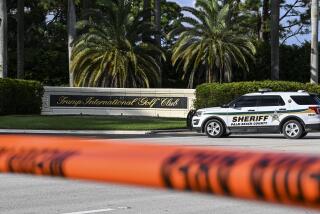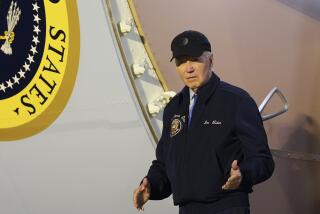Fire, fury and a vacationing president
One lesson White House officials have learned so far from President Trump’s vacation at his golf resort in Bedminster, N.J.: When Trump has time on his hands, he does what he likes, opining on public affairs, often in incendiary terms.
The president was most visibly in his element on Thursday, holding forth in not one, but two mini-news conferences with the pool of reporters allowed onto the grounds of the Trump National Golf Club.
Blowing past a stop sign from his press secretary, Sarah Huckabee Sanders, he talked at the second session for more than 20 minutes, taking questions on North Korea, special counsel Robert S. Mueller III, Paul Manafort, Senate Majority Leader Mitch McConnell, Russia’s planned expulsion of American diplomats from Moscow and so on.
The day served as a reminder that for all the political utility Trump finds in attacking the “fake news,” he revels in exchanges with reporters. At the same time, it showed how difficult a task the new White House chief of staff, John Kelly, faces in imposing order on a president who truly likes being surrounded by a certain amount of chaos.
Good afternoon, I’m David Lauter, Washington bureau chief. Welcome to the Friday edition of our Essential Politics newsletter, in which we look at the events of the week in Washington and elsewhere in national politics and highlight some particularly insightful stories.
A WAR? OR JUST A WAR OF WORDS?
Trump has been going on television, offering opinions about national and world affairs for decades. As long ago as 1999, on NBC’s “Meet the Press,” he told the late Tim Russert that the U.S. should consider launching a preemptive strike to destroy North Korea’s nuclear test sites if negotiations failed.
His job is different now, but Trump’s desire to be an attention-getting commentor-in-chief has not. That often leads to a disconnect between his words and the actual policies of the government over which he presides but shows little desire to be responsible for.
That disconnect has shown up on many issues, but never before in a situation where the stakes are as high as the confrontation with Kim Jong Un, North Korea’s young, untested leader.
Back when Trump appeared on Russert’s show, North Korea did not yet have a nuclear weapon — just a program to build one. Some military experts believed a preemptive strike would work. Today, after three successive administrations tried and failed to impede Pyongyang’s efforts, the North Koreans have a small, but very real, nuclear arsenal, which Ralph Vartabedian detailed. Most military experts believe a strike would fail to completely eliminate it.
In 1994, when the Bill Clinton administration came close to ordering a strike against North Korea, Pentagon simulations estimated that a million people might die in the ensuing war, as Barbara Demick wrote in reviewing the military scenarios. Even if nuclear weapons did not come into play, the toll likely would be higher now because Seoul, which sits in easy range of North Korean artillery, has grown so much in the last couple of decades, she noted.
That’s one reason why, as Demick also wrote, the two sides have never completely stopped talking — at least about the possibility of holding talks. But the bottom line has never really changed: Three generations of the Kim family have been determined to get nuclear weapons, which they’ve seen as the ultimate protection for their dynasty’s continued control of North Korea. Successive U.S. administrations have been unwilling to accept that outcome, but also unwilling to accept the casualties involved in fully preventing it.
A huge unknown now is whether Trump shares that belief about the unacceptability of the death and destruction that would be caused by a new Korean War.
One main weapon the U.S. has tried to use to limit North Korea has been economic sanctions. This past weekend, the United Nations Security Council adopted the toughest sanctions yet, which could severely harm the North’s already weak economy.
In a typical administration, the White House would have celebrated the passage of those sanctions, which was a significant diplomatic success for the U.S., then taken some time to see if it could prod, cajole or entice China and Russia into fully enforcing them.
This, of course, is not a typical administration. Whether because he was bored in Bedminster and wanted to stir things up or upset by news reports about North Korea’s success in building a warhead small enough to mount on a missile or as part of a deliberate good cop/bad cop effort, Trump on Tuesday lashed out with his threat to unleash “fire and fury like the world has never seen” if Kim’s government continued to threaten the U.S. Along the way, he made false claims about having upgraded the U.S. nuclear arsenal, as Bill Hennigan explained.
As Trump continued to boost his rhetoric, Defense Secretary James N. Mattis and Secretary of State Rex Tillerson continued to stress diplomacy.
Trump’s language caught his top advisors by surprise, and the gap between his bellicose pronouncements and their more measured ones left the world guessing at U.S. intentions, as Tracy Wilkinson and Jonathan Kaiman wrote.
Keeping the adversary guessing is not necessarily a bad thing. Blundering into a war as a result of each side miscalculating the other’s intentions is. Whether that’s where we’re headed, of course, is unknown.
Despite the sound and fury, we’re not nearly as close to the edge of war as the U.S. and North Korea have been, as recently as the 1990s. But Trump introduces a new and unpredictable dynamic into an already tense situation.
TRUMP’S OTHER WAR, WITH THE REPUBLICAN PARTY
Not content with stirring up a fight with North Korea, Trump this week also took repeated pokes at his ostensible allies in the GOP. His main target? The Senate majority leader.
Over the weekend, McConnell, who has carefully avoided criticizing Trump, told an audience back home in Kentucky that the president had started out with “unrealistic expectations” of how quickly progress could be made in Congress.
True to form, Trump punched back. In a series of tweets, he chided McConnell for not winning passage of a bill to repeal the Affordable Care Act, noting that for seven years, Republicans have promised to do so. By Thursday, he went further, calling the failure a “disgrace.”
McConnell, true to his form, kept silent.
The fight is not likely to change the overall shape of the legislative agenda — most of what Congress is considering are Republican plans more than Trump plans, after all.
But the moves by Trump seem to be part of an effort to shift blame away from the White House for the failure to pass any major legislation so far this year. That could help Trump hold onto the loyalty of his core supporters — he remains significantly more popular than Congress among Republican voters. But the criticism risks reducing enthusiasm among Republicans for next year’s midterm elections, further endangering GOP chances.
The tensions between Trump backers and the established GOP are also cropping up in some prominent races, notably in Arizona, where Sen. Jeff Flake, an outspoken critic of Trump’s, faces a primary challenge, as Cathy Decker wrote.
The tensions also factor into thinking about the next presidential contest, in 2020. As Laura King wrote, Vice President Mike Pence’s sensitivity to any talk about his 2020 ambitions testified to the White House insecurity on that topic.
Even as Trump urged McConnell to try again to push repeal of the healthcare law, his Health and Human Services secretary, Tom Price, made a subtle, but potentially important, shift in language. Appearing on Fox, Price for the first time suggested that the law could be “fixed” rather than simply repealed.
A RAID SIGNALS A STEPPED-UP INVESTIGATION
Special counsel Mueller has run a lot of high-profile investigations in his many years at the FBI and the Justice Department. He knows that an early morning appearance by FBI agents bearing a search warrant is a good way to focus a potential defendant’s attention. The raid of Manafort’s home in the Washington, D.C., suburbs didn’t become publicly known for two weeks, but as Joe Tanfani and Noah Bierman wrote, it provided a clear signal that Mueller’s investigation is moving aggressively.
The fact that the FBI got a warrant means agents persuaded a magistrate that they had probable cause to believe that a search would turn up evidence of a crime. That’s not an especially high hurdle — federal magistrates don’t often turn down warrant applications, although they do sometimes —but it’s a sharp contrast with Trump’s declaration that the entire investigation is a “witch hunt.”
The agents sought records related to foreign bank accounts and foreign registrations, an indication that Mueller’s team is looking into potential financial wrongdoing on Manafort’s part, perhaps violations of the Bank Secrecy Act, which requires Americans to report ownership of certain foreign bank accounts.
A standard technique for investigators is to use the possibility of charges on one crime as leverage to get witnesses to talk about other topics. Whether that’s what’s happening with Manafort is not known, but within days of the raid becoming public knowledge, Manafort’s spokesman reported that he was changing lawyers, hiring a firm with a lot of expertise handling complex financial allegations.
Trump at his impromptu news conference denied having any plans to fire Mueller and had some kind words for Manafort. But he also distanced himself from his former campaign manager, saying he had worked in the campaign for only “a very short period of time, relatively short period of time” and that he “probably makes consultant fees from all over the place. Who knows? I don’t know.”
ROHRABACHER AND THE RUSSIANS AND SOME OTHER NOTABLE STORIES
Rep. Dana Rohrabacher’s name keeps coming up in the Russia investigation. Sarah Wire tells you everything you wanted to know about why. Sarah also reported on the latest developments in the investigation of campaign spending irregularities by Rep. Duncan Hunter.
Trump emphasized tough law enforcement in comments on the opioid epidemic, contradicting the recommendations of his own commission on the subject, Bierman and Noam Levey wrote.
Atty. Gen. Jeff Sessions announced that the Justice Department will boost investigations of leaks and might pursue reporters, Joe Tanfani wrote. The attorney general’s announcement drew some praise for Sessions from Trump.
Education Secretary Betsy DeVos has kicked off an emotional battle over campus sexual assault rules, Lauren Rosenblatt wrote.
Wilkinson examined a mystery from Havana: Did covert spy gear cause U.S. and Canadian diplomats in Cuba to lose their hearing?
And, finally, John Myers in Sacramento looked at who spends the most on lobbying of state government. No one spends more than local governments, he reported.
ALL THE PRESIDENT’S TWEETS
Twitter has long been Trump’s favored means of pushing his message. We’re compiling all of Trump’s tweets. It’s a great resource. Take a look.
More to Read
Get the L.A. Times Politics newsletter
Deeply reported insights into legislation, politics and policy from Sacramento, Washington and beyond. In your inbox three times per week.
You may occasionally receive promotional content from the Los Angeles Times.











